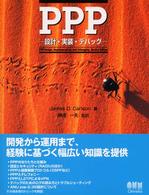- ホーム
- > 洋書
- > 英文書
- > Psychology
基本説明
Brings together data from neuropsychology, neuroimaging studies and evoked potentials that analyse the impact of literacy on the functional organization of the adult brain.
"Special Issue of the International Journal of Psychology"
Full Description
Several studies have suggested that education and/or literacy may protect not only against the effects of biological aging but also against the clinical manifestation of cerebral neuropathology.
In clinical neuro-psychology, much debate has centered on whether the brain is more likely to degenerate as a result of overuse or underuse. There is a popular belief that an active mental life may delay the cognitive deterioration associated with normal aging. Animal studies also support the concept that environment can influence brain development.
This special issue brings together data from neuro-psychology and neuro-imaging studies, and evoked potentials that analyse the impact of literacy on the functional organization of the adult brain. Discussion of how specific life experiences such as learning how to read and write can change patterns of brain activation and implications of these findings for the theory of cognitive and brain reserve are presented.
Contents
1. Can Literacy Change Brain Anatomy? F. Ostrosky-Solís 2. Targeting Regions of Interest for the Study of the Illiterate Brain A. Castro-Caldas 3. Imaging Cognitive Reserve Y. Stern, N. Scarmeas, C. Habeck 4. Can Learning to Read and Write Change the Brain Organization? An Electrophysiological Study F. Ostrosky-Solís, M. A. García, M. Pérez 5. Culture or Education? Neuropsychological Test Performance of a Maya Indigenous Population F. Ostrosky-Solís, M. Ramírez, A. Lozano, H. Picasso, A. Vélez 6. Literacy and Cognitive Change among Ethnically Diverse Elders J. J. Manly, D. Byrd, P. Touradji, D. Sanchez, Y. Stern 7. There is Not any Specific Brain Area for Writing: From Cave-Paintings to Computers A. Ardila








